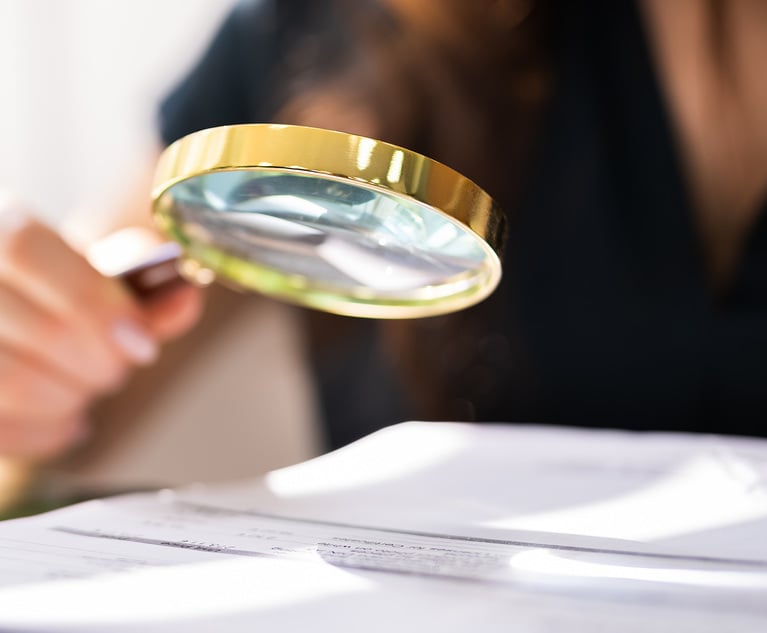Drinking to Relieve Stress? Bad Idea, Counselor
Dear Patrick:I work with someone who goes through periods of really excessive drinking, but as far as I can tell it is only when things are unusually…
March 21, 2017 at 06:42 PM
6 minute read
Dear Patrick: I work with someone who goes through periods of really excessive drinking, but as far as I can tell it is only when things are unusually stressful with his practice. I'll occasionally see concerned looks among people at the firm, but the concern always fades when the extreme stress and extreme drinking fade. Is this something to truly worry about, or is this the sort of normal rhythm you see in many lawyers/firms?
-Matt in Boston
Dear Matt:
Your question raises an important issue that I will likely explore with some regularity in this column: the very real relationship between stress and drinking. Let me say at the outset though that you should forget about whether the pattern you describe is “normal” among lawyers when trying to determine if it should worry you. There are a lot of normalized behaviors in the profession that are nonetheless troublesome, and the fact that we've become somehow OK with them is part of the problem. It's almost like the legal profession's own version of Stockholm Syndrome, and unhealthy behaviors are our captors. Viewed objectively, our acceptance of them is quite irrational. The behavior you describe is far from ideal, and there are good reasons why someone should intervene, but first some useful background.

Now, as you might imagine, I am frequently asked for my take on why the legal profession has so many problems with drinking and such poor mental health, and I normally always start with the stress, followed by a mention of the profession's culture, which promotes terrible learned responses to that stress. Of course, using alcohol to deal with stress is not unique to the legal profession (“I need a drink!” is the clichéd exclamation of pretty much every stock fictional character we see who has had a long or stressful day), but lawyers can take it to another level, and do so at their own peril.
Stress is a well-known and well-documented risk factor for the onset of substance abuse and addiction, as well as for relapsing back into addiction after periods of abstinence and recovery. There is a ton of research on this, but you probably don't need the data to understand what is on some levels a common-sense equation. Stress is an unavoidable part of life, and if your go-to solution for coping with or escaping unavoidable parts of life is drinking or using drugs, you are setting yourself up for a lot of drinking or drug use. The more often this happens, the more reliant you are likely to become on your substance of choice, and soon your stimuli-response pattern (as in, stress = drink) becomes hardwired into your brain—and sadly, your life.
Unfortunately, and unbeknownst to most drinkers who think that alcohol is helping them manage their stress, it is in fact an especially ineffective and self-defeating tool in that regard. Compelling studies have demonstrated how alcohol use itself exacts a psychological and physiological toll on the body that can compound the damaging effects of stress, and also prolong recovery from a stressful event. In other words, if you're stressed and have some drinks to deal with it, you may temporarily feel more relaxed once your blood alcohol content reaches a certain point, but your body is telling and experiencing an altogether different and less pleasant story.
To make matters worse, drinking to cope with stress has the paradoxical effect of eventually reducing one's stress tolerance: long-term heavy drinkers experience higher levels of anxiety when faced with a stressful situation than nondrinkers or moderate drinkers.
Finally, and perhaps most important when it comes to stress-drinking and the risk of addiction, stress can also decrease the pleasant effects of alcohol and therefore increase the craving for more alcohol to produce the desired effect.
Given the high-stress nature of the legal profession (starting in law school, really), the connection between stress and problematic substance use can't be underscored enough. The stress levels of lawyers don't show any signs of abating, with technology and our constant state of connectedness only accelerating the pace of an already demanding profession. Moving away from a reliance on alcohol and drugs and toward healthier stress management techniques and resilience-enhancing behaviors has probably never been a worthier or more timely goal for the profession.
(Sidebar: It's worth pointing out that chronic stress in and of itself can be quite damaging to our physical and mental health, and lead to its own form of impairment, irrespective of whether there is any substance use involved. Alas, that's a discussion for another day.)
Now, back to the lawyer in your office. What you're describing is clearly problematic alcohol use on his part, and every time the “concerned looks” of your co-workers fade, he gets to spin the wheel of pending disaster one more time. If his stress-induced drinking episodes truly are very excessive, do I really need to catalogue the parade of horribles that could await him, the firm and his clients the next time the stress level of his practice ramps up? No, I don't.
But more importantly, I'm out of space for this week's column. Let me just say the time for the appropriate person(s) at your firm to approach this man about his drinking is now. Well, the time was probably several years ago, if your firm is like most, but still, you get my point. There is no time like the present. You should discreetly express your concerns to the designated point person for reporting issues like this (perhaps it is the firm's general counsel), and ask that individual to take it from there.
Have a question? Send it to [email protected], and I'll see you back here in two weeks.
Patrick R. Krill is the founder of Krill Strategies, a behavioral health consulting firm focused exclusively on the legal industry. Go to www.prkrill.com for more information.
This content has been archived. It is available through our partners, LexisNexis® and Bloomberg Law.
To view this content, please continue to their sites.
Not a Lexis Subscriber?
Subscribe Now
Not a Bloomberg Law Subscriber?
Subscribe Now
NOT FOR REPRINT
© 2024 ALM Global, LLC, All Rights Reserved. Request academic re-use from www.copyright.com. All other uses, submit a request to [email protected]. For more information visit Asset & Logo Licensing.
You Might Like
View All
Former Cahill Executive Committee Member, Leveraged Finance Pioneer Dies at 67

How I Made Partner: 'Prioritize What Is Important to You, Do What Energizes You,' Says Sarah Wellings of Sullivan & Worcester

To Ease Partner Pay Tensions, Some Law Firms Are Seeking 'Middle Ground' in Transparency
5 minute readTrending Stories
Who Got The Work
Michael G. Bongiorno, Andrew Scott Dulberg and Elizabeth E. Driscoll from Wilmer Cutler Pickering Hale and Dorr have stepped in to represent Symbotic Inc., an A.I.-enabled technology platform that focuses on increasing supply chain efficiency, and other defendants in a pending shareholder derivative lawsuit. The case, filed Oct. 2 in Massachusetts District Court by the Brown Law Firm on behalf of Stephen Austen, accuses certain officers and directors of misleading investors in regard to Symbotic's potential for margin growth by failing to disclose that the company was not equipped to timely deploy its systems or manage expenses through project delays. The case, assigned to U.S. District Judge Nathaniel M. Gorton, is 1:24-cv-12522, Austen v. Cohen et al.
Who Got The Work
Edmund Polubinski and Marie Killmond of Davis Polk & Wardwell have entered appearances for data platform software development company MongoDB and other defendants in a pending shareholder derivative lawsuit. The action, filed Oct. 7 in New York Southern District Court by the Brown Law Firm, accuses the company's directors and/or officers of falsely expressing confidence in the company’s restructuring of its sales incentive plan and downplaying the severity of decreases in its upfront commitments. The case is 1:24-cv-07594, Roy v. Ittycheria et al.
Who Got The Work
Amy O. Bruchs and Kurt F. Ellison of Michael Best & Friedrich have entered appearances for Epic Systems Corp. in a pending employment discrimination lawsuit. The suit was filed Sept. 7 in Wisconsin Western District Court by Levine Eisberner LLC and Siri & Glimstad on behalf of a project manager who claims that he was wrongfully terminated after applying for a religious exemption to the defendant's COVID-19 vaccine mandate. The case, assigned to U.S. Magistrate Judge Anita Marie Boor, is 3:24-cv-00630, Secker, Nathan v. Epic Systems Corporation.
Who Got The Work
David X. Sullivan, Thomas J. Finn and Gregory A. Hall from McCarter & English have entered appearances for Sunrun Installation Services in a pending civil rights lawsuit. The complaint was filed Sept. 4 in Connecticut District Court by attorney Robert M. Berke on behalf of former employee George Edward Steins, who was arrested and charged with employing an unregistered home improvement salesperson. The complaint alleges that had Sunrun informed the Connecticut Department of Consumer Protection that the plaintiff's employment had ended in 2017 and that he no longer held Sunrun's home improvement contractor license, he would not have been hit with charges, which were dismissed in May 2024. The case, assigned to U.S. District Judge Jeffrey A. Meyer, is 3:24-cv-01423, Steins v. Sunrun, Inc. et al.
Who Got The Work
Greenberg Traurig shareholder Joshua L. Raskin has entered an appearance for boohoo.com UK Ltd. in a pending patent infringement lawsuit. The suit, filed Sept. 3 in Texas Eastern District Court by Rozier Hardt McDonough on behalf of Alto Dynamics, asserts five patents related to an online shopping platform. The case, assigned to U.S. District Judge Rodney Gilstrap, is 2:24-cv-00719, Alto Dynamics, LLC v. boohoo.com UK Limited.
Featured Firms
Law Offices of Gary Martin Hays & Associates, P.C.
(470) 294-1674
Law Offices of Mark E. Salomone
(857) 444-6468
Smith & Hassler
(713) 739-1250










